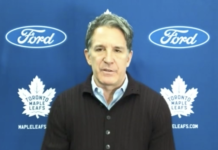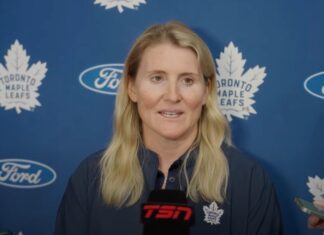Full transcripts below of Lou Lamoriello’s media hits on TSN1050 and Sportsnet 590, discussing the Jhonas Enroth signing, Mark Hunter’s promotion, the PTOs for Brandon Prust and Roman Hrabarenka, and much more.
Mark Hunter was promoted today. How does his job description change with this new title, if at all?
Lou Lamoriello: Really, his job description does not change at all. It’s really what he has [already] been doing. It’s an acknowledgement of the role that he has had. When I first came on after being here for a couple of months, I spoke to Brendan about it and we spoke about this – the role that [Hunter] takes and the position that he has and the value that he brings. He should have this title, and was doing things to deserve the title. This is just really a formality of putting it in the public eye.
What have you learned about Mark Hunter in the year that you’ve gotten to spend working closely with him?
Lamoriello: I learned everything that I knew about him first hand. Certainly while I was in New Jersey we had players from London, and I certainly interacted with him on that note, and knew of his scouting abilities and his eye for talent and also the way he approached putting a team together, which has a similarity to my thought process. I have tremendous respect [for him]. When I got to know him on a daily basis – and I say on a daily basis because I speak to him every day — that endorsed what I really felt about him.
How have you seen him evolve over the last year? He came into the organization very highly thought of, running a very successful OHL operation down there in London. He was the guy who could go and mine the junior levels for the club. In what ways has he evolved since joining the pro ranks?
Lamoriello: I don’t know if there was anything specific that you could point to as far as evolving. His experience speaks for itself. You really don’t know what experience is until you have it. Mark is very comfortable in his own skin. He’s willing and does give his opinion on what he feels and his thought process. He understands that if it isn’t always that way you just go forward because he knows what it is to be in that position. That’s what I respect and admire the most about him, is his opinion is his and if he’s the only one that might have it a certain way – so be it. It’s not going to stop him from mentioning that. That’s the type of people that you really want around you.
How many games do you expect Frederik Andersen to play this season?
Lamoriello: If you look at the number of back to backs that we have, I think we are around the top of the league. I think it’s around 20-plus. I think you’ll see Jhonas playing a minimum of 20. Mike and I have spoken about that. You never put that in cement. You never know what the situation is. And also, Freddie has not really had a complete season where he played 82 games, or 70 games. We have to respect that. I’ve had experience with that when Cory Schneider was in a similar situation, although Freddie has played more coming into the starting role than Cory did. You have to be careful with that. That is a process. You have to respect that as far as getting used to playing that. Also, this year is a unique year with the World Cup. Also, the way the new rule is with reference to a couple of breaks in the year – one in particular that we have, added to the All-Star break. Having said all that, he’ll be in at least a minimum of 20, 22, 24 games.
You mentioned Frederik Andersen, and he’s taken a starter role in Anaheim at points but he has not done it over a full season. In light of that, why was it right for the organization to immediately go long term with a five-year contract for him?
Lamoriello: First of all, it’s a great question. Secondly, there are reasons why he didn’t have a starting role. They had a young goaltender that was coming up that was highly touted. They had to find out over a period of two years – is that the goalie they wanted to go to at that age? So they had to make some decisions, and I think you saw that last year during the playoffs when they tried to give it to the other goaltender and then they had to come back to Freddie. He’s 27 years old. Our staff feels extremely high on him. I have tremendous confidence in him. I think he’s got the right personality for our organization and the right personality for this market.
It’s interesting you mention personality. You projected, obviously quite successfully, with Martin Brodeur as a goaltender, and quite successfully with Cory Schneider. What, in terms of a personality of a goaltender, do you look for and say, “this guy has the potential to be, if not elite, a very good goaltender?”
Lamoriello: First of all, you have to have talent and athleticism, which he does. You have to know the game, and be a student of it, which he is. The other quality, in my opinion, is that you have to be able to put aside a loss. You have to be able to stay like a duck on water. In other words, nothing changes. You have to be able to recover as quick as you can when something doesn’t go right like a bad goal. It’s a trait that I’ve seen in him. Hopefully all three of those qualities is something that will turn out the end result of what we feel he can be.
Playing with what your lineup might look like, you’ve got a lot of pieces that could be on the team. A lot of them are young. What’s the point of having too many rookies? Is there a line that you have to be careful in terms of walking that way?
Lamoriello: First of all, in my opinion we have the best coach in the game and one of the best coaching staffs in the game, if not the best. Mike knows exactly where to put people, when to put them, and when they are ready to take certain types of roles. We have, in our roster, veterans, we certainly have younger players, and we have middle players who are beyond being rookies and have had experience. I feel – and I know Mike feels the same way – that I have tremendous confidence that none of that [will be a problem] as far as whether we’re too young, too this, or too that. Mike will solve that problem quickly.
There’s not a point where, say, five rookies is too many, or something like that?
Lamoriello: No, they’ll determine in training camp when they get the opportunities to have success. We’ll find out who belongs, who doesn’t belong, and who needs a little more time. The only thing that we can assure you is that they will come up a little later rather than too soon. The foundation is the most important thing. We’ve committed ourselves to a process of growing in one direction. We’re going to stay on that process.
With respect to Mitch Marner — this is a kid who had an unbelievable year at the junior level, and it’s either the Toronto Maple Leafs or the London Knights for him, just because of the way the rules are laid out. He’s got to make the team out of camp, it’s fair to say. Let’s speak hypothetically and say he doesn’t. What does he stand to gain at the OHL level?
Lamoriello: I don’t like to speak hypothetically. Right now, let’s get to training camp. Let’s give him an opportunity to do the things that we all feel he can do. He’s done it at every level he’s been at. Now he’s at a point where there is a decision that has to be made. We have total confidence that he has the ability to play. We are going to give him that opportunity. I would not be surprised if he is with the Toronto Maple Leafs.
Let’s talk about Jhonas Enroth. Obviously there was a need for a backup goaltender with the dealing of Jonathan Bernier, needing someone to back up Frederik Andersen. The decision to sign this guy – what was it based on, what were your scouts saying about him, and what do you think you have in Jhonas Enroth?
Lamoriello: We have an individual who has certainly played in this conference. He’s played in this division. In other words, he accepts his role. I’ve had the opportunity to spend some time with him. I’ve also had the opportunity to compete against him for quite a while and he played extremely well. Those are all the things that you remember and come forward. Our staff has very high regards for his abilities. As you know, we’ve signed Freddie Andersen to be the number-one. Whenever you sign a backup goaltender, he has to be an individual of a certain quality. They both speak fluent Swedish. I think that’s an asset. He understands his role and wants to be here, and accepts that along with the qualities he has.
At this time last year, you had James Reimer and Jonathan Bernier going into the season. There was the whole, “who is going to be number one?” Did you feel strongly that you had to move away from that and find that guy – whoever that guy was going to be – and say, “here is our number-one guy, and here is our backup.” Did you feel like that had to change with this team?
Lamoriello: I think we all felt that way within the organization. From the experiences I’ve had, and watching my own situation and going through it and watching and studying other organizations, there is no question in my mind that, in my opinion, you have to have a number-one goaltender and you have to have the right support individual. That could change a year, two years, three years [from now], but you need a number-one goaltender.
You have a couple of young guys with the Marlies – Garret Sparks and Anotine Bibeau, both of whom have had little bit of NHL experience; well, Sparks has a fair bit of NHL experience. Why not give one of them the NHL job?
Lamoriello: I think that we have the perfect storm with them staying with the Marlies right now, growing. Not taking a chance of them coming up and not being successful. Not taking that you only look at the negatives – it could go the other way – but there is no hurt in the experience that they can receive, especially playing at the level they are playing. Throughout the year, there is always injuries, or time that they can spend in the NHL, which we’ve all seen in the past. They’re young, they have a ways to go, and when you’re not ready, why put them in that situation?
You have some players who are in college. Do you think the Jimmy Vesey situation, in terms of deciding to hold on and become an unrestricted free agent – and he’s not the first guy to do it – will that change how your team looks at college players at all and when you look to sign them?
Lamorello: I don’t think so. I think that there are exceptions, and I would like to think that the number of college players that this has happened… These are exceptions, when they come about. They might be for a reason. I think you might see more players coming out more often than staying in, but not because of fear of this rule. It’s because players are going into college a lot older than they did in past years. That’s the reason you see players being signed after their freshman or sophomore year. They’re 21, 22. They’re not going into college like they used to at 17 and 18. I think that’s the biggest problem that college hockey has to look at. Coaching has changed. They’re asking players to go play in the USHL more often than not, or playing junior B, to get them more mature and trying to get a team that can win at that point rather than getting young players and developing them when they’re in college. I think that’s the change.
You had so many years at Providence, and I understand that was a different time. Circumstances were very different. There is a lot going on right now with the push and tug and pull between the CHL and colleges. Sometimes a player will go to college and then leave and go to the CHL. We’ve seen that happen. Is that an issue that you think the colleges are going to have to deal with, in terms of the age of the players, or is that something they have to accept?
Lamoriello: I think that’s something they have to accept. You know I spent a lot of seasons coaching in college. 15 years. At that time, players could play major A hockey in the early years. I’ve always said that there are players who are not made to go to college. There are players that are not made to go to junior and are meant to go to college. We’ve seen some great ones throughout the NHL. We’ve seen MVPs, Calder Cup winners and so forth that have gone to college, and also junior. I don’t think that this is going to change. I think that we might see the NCAA and junior hockey coming together in coming up with an agreement because of some of the older players going to college. In the earlier years, players were drafted while they were in college. Now they’re drafted way before they ever get to college.
Scouting is so much different than it was in the past. There are so many eyes and ears. The idea that a guy is kind of “undiscovered” until he gets to college – you don’t have that anymore, do you? You guys must have a pretty good read on guys. He may mature when he goes to college, and he may change physically, but in terms of the hockey player, I would think that you have a pretty good read on a player before he goes?
Lamoriello: For the most part. The only difference with that is that, if there is someone who is a late developer, he is given that opportunity in college to show that. If he is in junior and he’s a late developer, unless he gets signed or gets an opportunity, it’s a little more difficult for him to be at the forefront and have himself in front of the eyes of the scouts.
Can you tell us a little bit about Brandon Prust and the PTO?
Lamoriello: I’ve seen Brandon Prust play quite a bit while he was with the Rangers, and certainly thought it was a loss when he left there. I watched him in Montreal also. Mark Hunter knows him extremely well from London. I had the opportunity to spend a bit of time with Brandon this summer to hear what exactly his thoughts are and where he was at. He wanted to come to camp; he wanted to give it a try and see where he was at. He brings a certain element. There is no risk involved. He will be given that opportunity. His representative is Claude Lemieux, who of course spoke to me about him. We’re delighted that he’s going to come and we’ll give him an opportunity.
We’ve signed a young man who was in the New Jersey organization, Roman Hrabarenka, a right-shot defenceman. He will also come to camp. That is it at this point. Will there be another one? Right now there is no one in mind, but there is still time. We’ll see.
You’re bringing in Prust. We know what kind of player he is. You signed Matt Martin. Did you feel that this team did not have enough of the physical, sandpaper element last year that it’s going to need more of?
Lamoriello: I think that we lacked an ingredient in the lineup. Not that the philosophy of the lineup has changed, not that the speed and the abilities that we’d like to see this team have [has changed]. I just believe, and I know Mike believes the same way, that there were times that some of our players, I don’t think, were allowed to do some of the things that you should be able to do out there. That was one of the reasons, certainly, that Roman Polak was brought back. Also, I think they’re quality people and sometimes people play just a little taller.
How would you describe the move to promote Mark Hunter? Was it just a move to clarify the title, perhaps?
Lamoriello: I think it was just a formality and recognition at the same time of who Mark Hunter is and what he brings to the organization and how important he is. He’s become more important each and every day. I have tremendous respect for him. There is no one in our organization that doesn’t look to him, with his experience and his eye for talent. For me, his most important quality is he can read players and has an opinion and doesn’t mind if that opinion turns one way or the other. He certainly always wants it to be right, but he gives his opinion. That’s what you need from everyone. Not everyone is going to agree [with everything] that is done, but you need strong people. He’s strong. I can’t say enough about him. Spending this year with him and talking to him everyday… what an ingredient to our organization. As is Kyle Dubas, Brandon Pridham, and so forth. We’re very fortunate here with the people that we have.
Transcribed by Alec Brownscombe




































